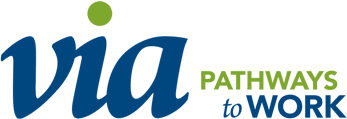
Five years of learning from youth, TVET partners, and employment systems.
Through the Via: Pathways to Work program, national TVET institutions and entrepreneurship partners in Mozambique and Tanzania equipped over 22,000 young people with work readiness life skills, career guidance, and/or entrepreneurship training. Graduates were more likely to secure permanent employment, earn increased income, and report increased satisfaction with their careers. Via's legacy is the integration of curricula and services by national TVET systems, and strengthening of networks connecting stakeholders.
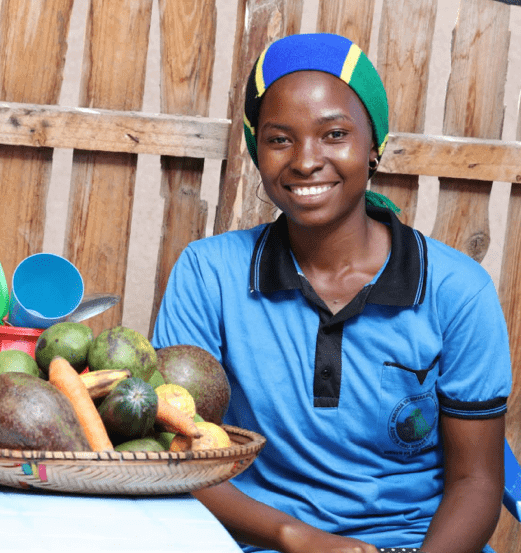
In partnership with the Mastercard Foundation, Via: Pathways to Work takes a systems approach to support the national technical and vocational education and training (TVET) systems to be more responsive to the needs of young people and industry.
Working closely with national training authorities and TVET centers (VETA and IFPELAC), entrepreneurship partners (TECC) and labor market intermediaries (INEP) in both countries, IYF is facilitating sustainable changes by integrating life skills training and career support services in order to impact the 500,000 youth who the institutions reach each year.
In addition, IYF is supporting trainers to use more learner-centered instructional techniques, as well as training administrators and managers to better use data to improve academic and on-the-job outcomes. These investments will continue to pay dividends by preparing future students and budding entrepreneurs to succeed in the world of work.
Learning is one of Via's essential pillars, with lessons informing Mastercard Foundation's and IYF's strategies. Throughout the program, IYF has captured learnings at the Systems, Institution, and Youth levels, which we are sharing below.
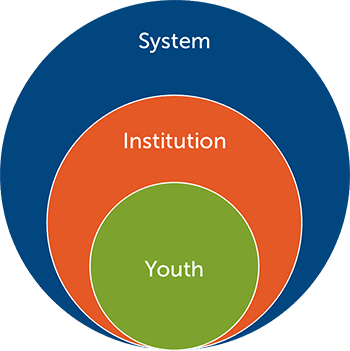
Scalable and sustainable improvements in the lives of young people can only occur when local actors have both the commitment and the capacity to plan, finance, implement, and manage solutions. IYF realigns resources, relationships, roles, and routines for lasting change.
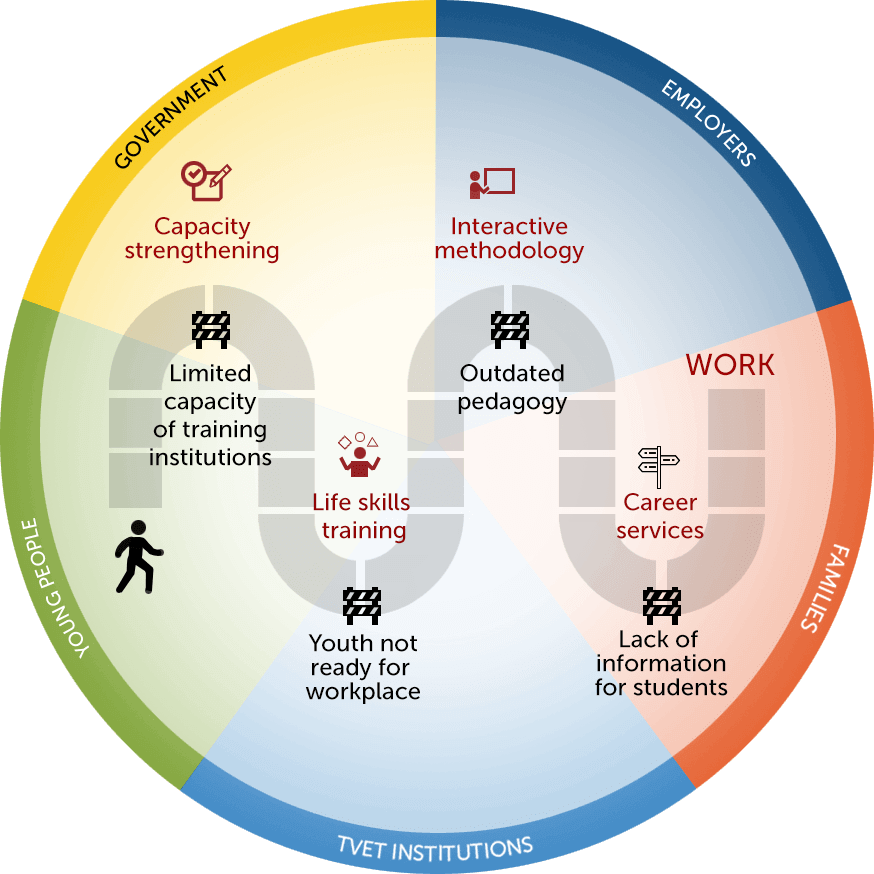
The program was originally designed to deliver a multitude of holistic services to youth. For IYF, recognizing our role as systems change facilitators meant shifting the focus from implementing all the services to identifying the right levers of change in the systems, (i.e., supporting integration of improved life skills and career services for young people), then bringing together the relevant actors in the ecosystem to facilitate those changes and establish norms and networks to continue developing solutions that address new challenges.
"The Via project was created to cater to the community. It intends to serve youth who go through VETA's vocational training short courses - to provide not only the technical skills training, but also the life skills training. This combination contributes to students' careers and their success in the workplace." -Joseph Kibehele, Principal, VETA, Mtwara, Tanzania
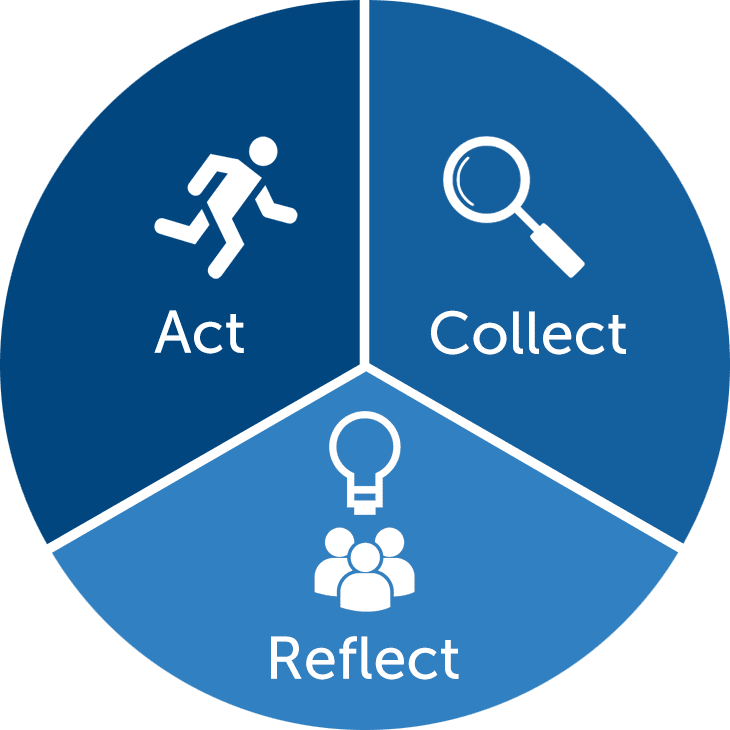
Systems are dynamic and there is always more to understand about how a system works. Therefore it is critical to consistently gather learnings, pause and reflect and adapt activities accordingly. This requires hiring adaptable staff, dedicating time for reflection, having flexible budgets, and being transparent with and fully engaging partners. Through annual planning processes, quarterly performance workshops, and routine collaboration with partners, staff reflected on progress, identified opportunities to pivot, and adapted activities accordingly. IYF and Mastercard Foundation collaborated closely on adaptations to ensure changes not only aligned with program goals but were made to better achieve those goals. Adaptations such as adjusting the age range to be inclusive of all TVET students or IYF Mozambique delivering virtual training of life skills master trainers during COVID-19 allowed the program to be more relevant to partners and stay focused on partner needs and processes.
"Quarterly reviews were an invaluable safe space where project and partner staff critically decided what wasn't working and identified alternative approaches or solutions." -Joel Tomás, Capacity Strengthening Technical Advisor, IYF Mozambique
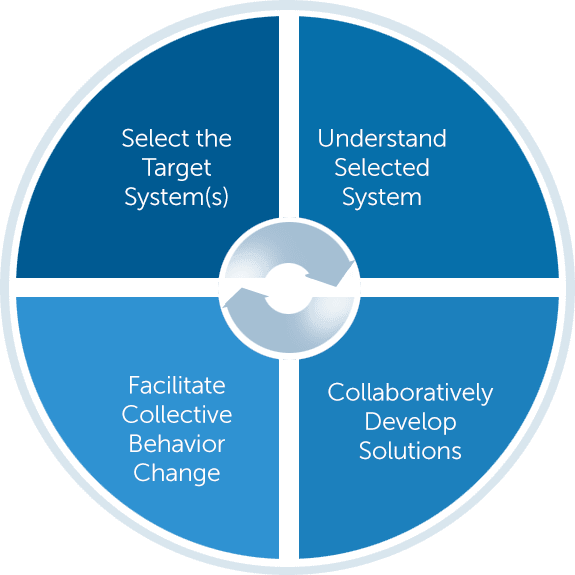
True partnership takes time and effort to develop. While market research is a critical component of understanding a system, building a foundation for successful implementation required IYF to effectively engage partners. Rather than remake the entire system or build a parallel one, IYF engaged the key players, assessed their position and influence as related to project goals, and sought the sweet spot of activities that would mutually benefit training institutions and industry. As shown in the cyclical systems approach process diagram (right)(above), each step relies on partnership and strengthens partnership.
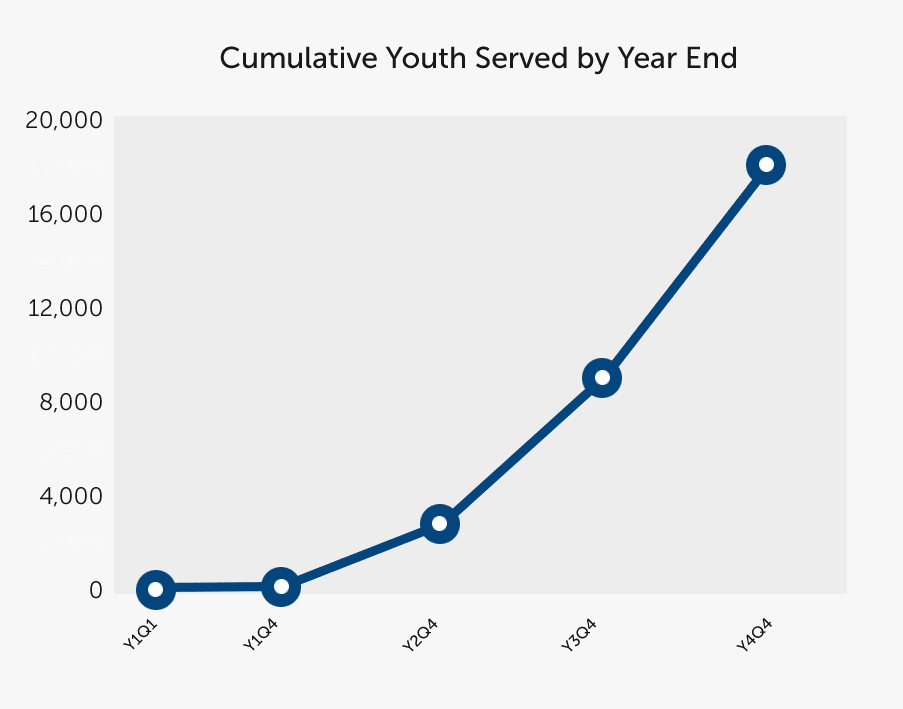
IYF did not start seriously progressing towards its lofty youth service target until almost the third year in. Early efforts focused on the preconditions for that outcome: establishing a shared vision, co-creating a transformation strategy, determining the organizational adjustments that needed to be made, formalizing agreements with partners, and then legitimizing the need for those changes based on the proof of concept project results. If a youth systems change program is successful, the number of young people served will continue to increase after the program ends as the new service expands in the system.
"Systems change is how to make things happen, and the first step is making sure we speak the same language and see the same problem” -Unami Mpofu, Sr. Programme Officer, African Union Development Agency (AUDA-NEPAD)
Addressing barriers to youth economic opportunities is not something that needs to be undertaken alone—indeed, it must be done together. IYF connects, convenes, and invests in our TVET partners, including the decision-makers and implementers.
Via partners in both Mozambique and Tanzania identified integration of improved work-readiness life skills training as the program priority and best opportunity for meaningful change for young people in their systems. This ultimately required an intensive process to incorporate Passport to Success (PTS) content and best practices into nationally approved curricular standards.
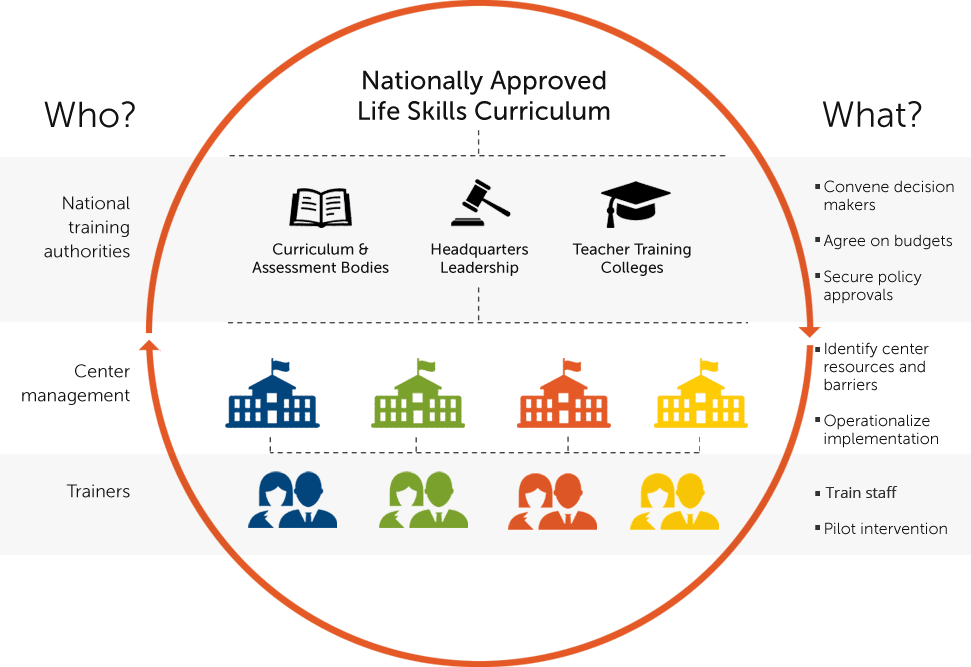
IYF initially focused on orientations and trainings on PTS lessons and methodology. By working with partner centers to train teachers, pilot new approaches, and measure and report positive changes in instructional capacity and youth outcomes, early adopters became critical advocates for sustaining PTS. This included teachers with increased feelings of control and efficacy, young people better equipped to navigate the pressures of school and work, managers seeking to better deliver on their mandate to train up their country’s young workforce, and employers more satisfied with TVET interns or graduates.
This work at the training centers occurred in concert with high-level engagement of key decision makers overseeing budgets, staffing, training management, curriculum, and assessments. This multi-year process led to the development and formal adoption of curricula adapted from PTS in Tanzania and Mozambique.
"The [life skills curriculum validation] workshop was attended by labor market analysts, the principals and vocational teachers who teach life skills. The validation workshop was an important step in verifying the accuracy of VETA-PTS blended lessons integrated short courses." -Validation Workshop Report, Morogoro, Tanzania
Via engages partners through formal and informal processes, and links program activities to existing policies and strategies to support priorities partners already have (e.g., increasing job placement rates for graduates or improving data analysis to inform service enhancements). To ensure ownership, partners’ involvement is critical at each step, particularly considering that institutions have multiple priorities championed by different actors in the organization, necessitating investing time with stakeholders to identify the right entry points.
IYF facilitated self-assessments to help institutions identify capacity strengthening priorities, better understand decision-making processes and incentives, and create buy-in and legitimacy from the beginning.
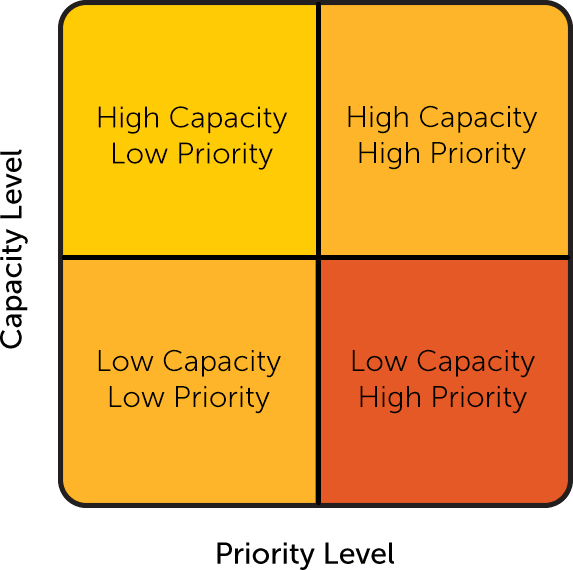
IYF and partners used this tool as part of the Quality Standards Toolkit (QST) after identifying institutional priorities and assessing capacities, to map components and identify the low capacity and high priority areas to focus capacity strengthening activities on.
IYF elevates partners' strategic priorities in Via workplans and has formal mechanisms for joint decision-making, stakeholder engagement, and collaboration such as quarterly partners’ meetings, sustainability workshops, annual planning meetings, and international learning events. Capacity strengthening activities themselves (workshops, training sessions, and coaching) with institutions are integral for creating the desired change – improved competencies and added services to better achieve their institutional goals to prepare young people for work.
"The Quality Standards Toolkit (QST) was an assessment approach where the partner’s introspective journey was as valuable as the end assessment results and influenced the capacity development plans of IFPELAC and INEP." -Joel Tomás, Capacity Strengthening Technical Advisor, IYF Mozambique
Transitioning the administration of and payment for changes introduced into a system is the hallmark of sustainability. Given Via’s five-year time limit and the complexity of advocating for and securing funding approval in public TVET systems, it was critical for IYF to move the conversation beyond externally led best practice toward institution-owned resources. Rather than saying, "Here is what we did and how much it will cost you to do yourself," IYF engaged partners to understand which approaches and quality assurances were realistic within the confines of available structures and resources. This meant exploring budget development and approval processes, teacher training schemes, human resource policies and procedures, and linkages between curricular development and assessment bodies.
Through this process, three VETA centers and the teachers training college in Tanzania revised funding structures for short courses to include their modified life skills curriculum KTS, and IFPELAC in Mozambique approved a funding plan for PTS life skills in their centers. Demonstrated changes in resources were critical in how IYF assessed the extent of change within each TVET system.
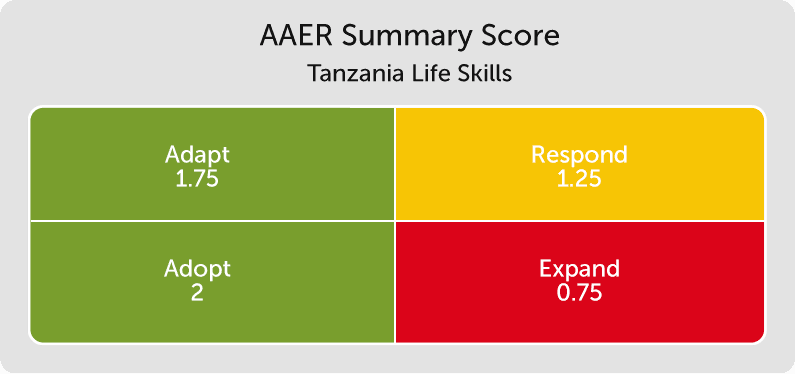
IYF modified the Springfield Center’s Adopt-Adapt-Expand-Respond framework to be applied for TVET systems. This included developing a set of indicators and using a 0-2 scoring scale and color coding to show the extent to which Via initiatives were being taken up by partner institutions and related systems actors. This example from Tanzania shows that adoption and adaptation of life skills training enhancements has been achieved and that while evidence for actor initiated responses and expansion exists, further progress is still needed before those outcomes can be claimed.
"IFPELAC will gradually assume the management of PTS in Via centers starting May 2020 and continue to review ways to ensure fair remuneration for trainers, adherence to ANEP regulations, and mechanisms to use PTS to generate additional income to sustain the provision of services over time." -Mahotas Declaration, a signed memorandum of understanding between IYF Mozambique and implementing partner IFPELAC
Scalable and sustainable improvements in the lives of young people can only occur when local actors have both the commitment and the capacity to plan, finance, implement, and manage solutions. IYF realigns resources, relationships, roles, and routines for lasting change.
"My dream is to become an electrical engineer. People used to wonder how a woman like me could be doing a so-called "man's job." My wish is that when I become an electrical engineer, I can help ensure that every Tanzanian has access to electricity. Through VETA, I received technical skills and improved my life skills to help me, as a woman in a non-traditional sector, pursue my career." -Happiness Nyamwelo, Graduate, VETA Dodoma, Tanzania

One of the benefits of TVET is flexible, modular training that equips one with marketable skills for employment or self-employment. This is important since in both countries the supply of youth labor vastly outnumbers the availability of formal sector jobs. Via students and graduates reported that the combination of life skills training with their technical or entrepreneurship education helped them improve in the classroom, at home, and in the workplace. Whether it was standing out to their employer, improved teamwork and stress management, or the ability to apply the technical skills they acquired to generate income during the COVID-19 economic downturn, the transferable skills are helping young people navigate complex, competitive, and often informal labor markets.
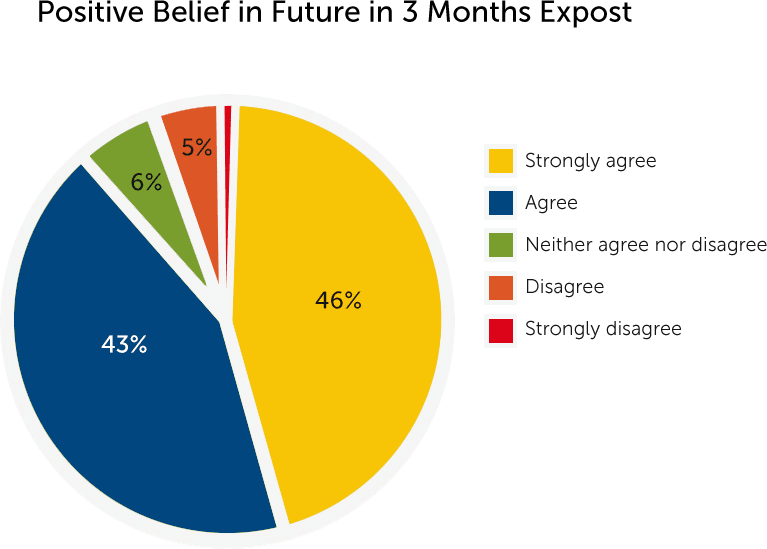
Of the youth sampled three months after graduating from the program, 89% strongly agree or agree that they have a good future ahead of them. Even though there is a mismatch in formal employment opportunities to workforce, youth are still positive and believe that there will be opportunities available to them, thanks to their flexible vocational education and marketable skills.
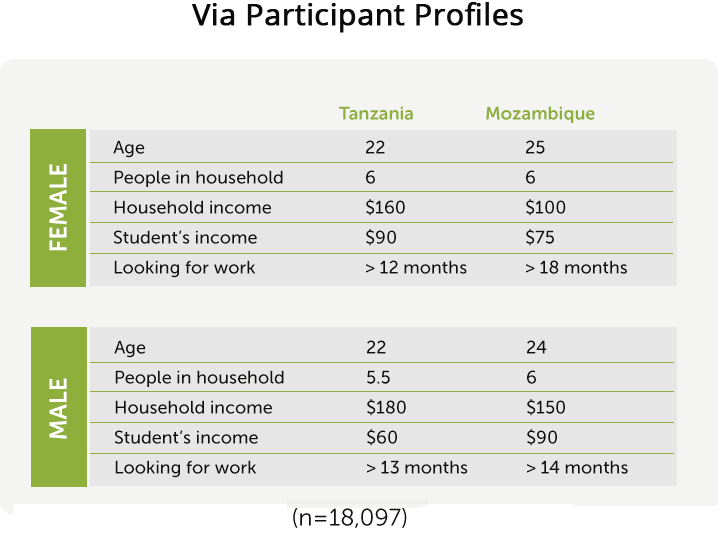
Analysis of baseline surveys reveal Via participants have spent an average of fourteen months looking for work by the time they enroll in their TVET course. Young people still largely make their TVET enrollment decision based on family influence and gender norms rather than labor market information, resulting in misaligned expectations or limited opportunities once a course is completed. For young women this can be especially problematic since female-dominated sectors often pay less and offer fewer social protections. It is important to have career guidance early on in TVET experience to support an occupational choice that combines interest and talent with market demand. Via partners are increasing access to quality guidance, that includes consideration of wage- and self-employment opportunities, and further education requirements, in advance of course selection.
"Nowadays I don’t have students queue at my office to change their courses, because all of them have chosen the course of their choice. Thanks to Via for bringing career guidance!" -Leonidazi Mushobozi- Registrar, VETA Dodoma, Tanzania
"The Via Project has turned job seekers into job creators through life skills and business management training. The project enabled start-ups to establish businesses and those with existing businesses to scale-up through the support of mentors and access to finance." -Anna Manoti, Project Manager, TECC, Tanzania
TVET authorities and advocates increasingly see entrepreneurship training as critical to translating new skills into economic opportunity. In Mozambique, the career guidance package (POP) includes entrepreneurship lessons and in Tanzania, the Vocational Education and Training Authority (VETA) is exploring mandating entrepreneurship for all courses. Many of Via’s TVET graduates who were not trained in entrepreneurship earned a livelihood through self-employment, even if they also earned money through a part-time job or transitioned to wage employment over time. In Tanzania, Via’s entrepreneurship partner TECC’s holistic training model successfully equipped trainees through business development skills, life skills, mentorship, and access to finance, with graduates starting businesses and even create jobs for other young people. While more resource-intensive, these holistic services are effective for entrepreneurial youth striving to establish their own formal business, and there is an opportunity to increase appropriate support services to other self-employed youth with different goals.
"PTS changed my life and the life of young trainees! The program has made young people more visionary. Some are developing the entrepreneurial spirit, creating their own businesses, and applying the knowledge acquired in PTS entrepreneurship lessons with a view to make their ideas more consistent and profitable." -Edson Merino Massangaie, PTS Trainer, IFPELAC, Inhambane, Mozambique